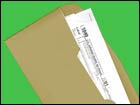Dumping old tax records
The IRS can audit you for years to come. Know the rules before trashing your files.
February 27, 2002: 11:44 a.m. ET
By Staff Writer Sarah Max
|
 NEW YORK (CNN/Money) - There are two kinds of people in this world -- those who save everything and those who relish throwing it all away.
NEW YORK (CNN/Money) - There are two kinds of people in this world -- those who save everything and those who relish throwing it all away.
When it comes to sorting through old tax documents, though, you'll need to know what to keep and what to send to the recycling bin.
The Internal Revenue Service advises that you keep all tax records, including your returns and any documents that support your income and deductions, for three years after you file your return or two years after you pay the tax, whichever is longer.
There are two reasons for this three-year guideline. First, said CCH federal tax analyst Mildred Carter, you have three years from the file date in which to go back and claim any deductions you overlooked. Secondly, the IRS generally has up to three years from the date you filed a return to audit you. Should you find yourself in that unfortunate situation, you'll need that paperwork to aid your defense.
Better to be safe than a minimalist
Many tax practitioners recommend going above and beyond IRS guidelines and keeping all tax documents for at least six years.
"Anything that's relevant to your tax return I would keep until six years after you file, and I would keep copies of the tax returns themselves as long as possible," said John Battaglia, director of private client advisory services for Deloitte & Touche.
Battaglia admits he's the kind of person who saves everything. "You're talking to a guy who still has his little league baseball uniform," he said.
But he has a point.
There are cases when the IRS has longer than three years to initiate an audit. For example, if it believes you understated your income by more than 25 percent, the IRS has up to six years from your file date to audit you. If you file a claim for a loss of a worthless security, the IRS has up to seven years to audit you.
If during any given year you did not file a return because you didn't earn any income, you'll want to keep records from that year indefinitely. There is no statute of limitations for an audit if you do not file a return.
One other consideration is that some states give themselves more than three years to initiate an audit. You can find links to state and local tax sites by clicking here.
Long-term residents of your filing cabinet
When it is time to get rid of old tax files, you'll want to first go through them and make sure you're not throwing the baby out with the bathwater.
You'll want to hold onto records concerning any property or assets you own or have inherited for at least six years after you sell. When you sell anything of value, the IRS will want proof of what you (or your relatives) initially paid and when you acquired it so it can calculate your profit and then tax you accordingly. If you are audited and don't have this paperwork, the IRS can calculate your gain using a zero basis, or cost, which will increase your tax bill substantially.
As of 1997, most people are not liable for taxes on home-sale profits of up to $500,000 for joint filers and $250,000 for individuals. If you think the difference between your purchase price and selling price will fall below these amounts, you may consider tossing documents related to your home before you sell it.
Just keep in mind that if you, for example, rent out your house or use a room as a deductible home office, you may not qualify for this entire exemption. And there is always the possibility that you'll sell your house for more than you ever dreamed. Should you be liable for taxes, you'll be glad you have receipts for home improvements, tax assessments, closing costs and other deductions that can reduce your taxable gain.
"I think it's a good idea to keep records of major transactions for as long as you can," said CCH's Carter.
Neat freaks need not panic. If you hate the thought of keeping all of that paper around, you can always scan all of your documents onto your computer, says Battaglia. Just make sure you back up what you save on a disk. 
|
| SPECIAL: |
|
|
|
|
|

|

